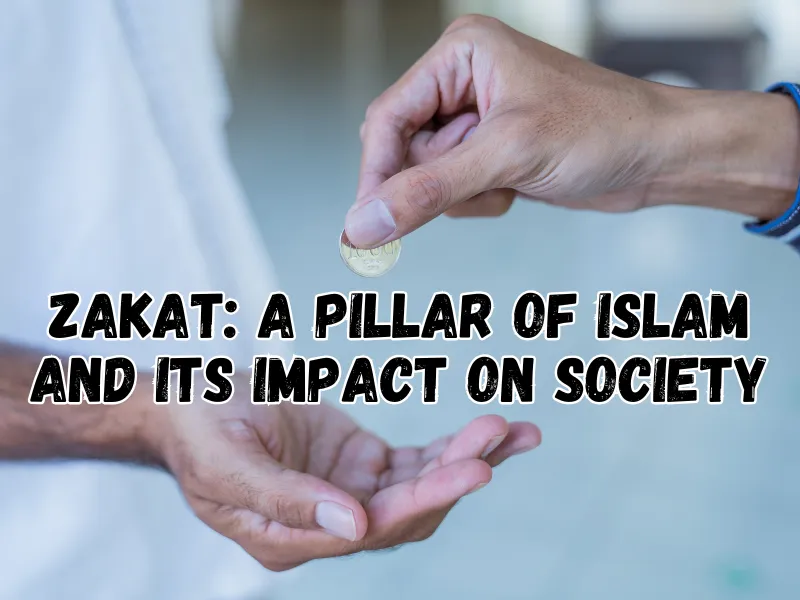
Zakat: A Pillar of Islam and Its Impact on Society
وَأَقِيمُوا الصَّلَاةَ وَآتُوا الزَّكَاةَ وَمَا تُقَدِّمُوا لِأَنفُسِكُم مِّنْ خَيْرٍ تَجِدُوهُ عِندَ اللَّهِ ۗ إِنَّ اللَّهَ بِمَا تَعْمَلُونَ بَصِيرٌ
"And establish prayer and give Zakat, and whatever good you put forward for yourselves – you will find it with Allah. Indeed, Allah is All-Seeing of what you do."
Surah Al-Baqarah (2:110)
Zakat: A Pillar of Islam and Its Impact on Society
Zakat is one of the five pillars of Islam, making it an essential obligation for every eligible Muslim. It is a system of wealth redistribution aimed at eradicating poverty and maintaining economic justice. The concept of Zakat is deeply rooted in faith, emphasizing charity, social responsibility, and purification of wealth.
What is Zakat?

Zakat is an obligatory form of almsgiving that requires Muslims to contribute 2.5% of their savings and assets annually. It serves as a financial duty and spiritual commitment, reinforcing the belief that wealth is a trust from Allah.
Eligibility for Paying Zakat

Muslims who possess wealth above the Nisab threshold (the minimum amount required for Zakat obligation) must pay Zakat. The threshold is determined based on gold, silver, or cash savings and must be maintained for a lunar year.
Who Can Receive Zakat?
The Quran (Surah At-Tawbah 9:60) identifies eight categories of Zakat recipients:

The poor (Al-Fuqara)
The needy (Al-Masakin)
Zakat administrators
Those whose hearts are to be reconciled
Captives and slaves seeking freedom
People in debt
In the cause of Allah (Fi Sabilillah)
Stranded travelers in need
Spiritual and Social Benefits of Zakat

Purification of Wealth: It removes greed and selfishness from one’s earnings.
Helping the Needy: Supports those struggling financially, promoting social welfare.
Spiritual Growth: Strengthens faith and brings one closer to Allah.
Economic Justice: Prevents wealth from accumulating in the hands of a few, ensuring fair distribution.
How to Calculate and Pay Zakat

Zakat is calculated based on one’s savings, gold, silver, business income, and other eligible assets. It should be given annually to deserving recipients or through trusted organizations that distribute it fairly.
The Consequences of Neglecting Zakat
The Quran warns against withholding Zakat.

“And those who hoard gold and silver and spend it not in the way of Allah – give them tidings of a painful punishment.” (Quran 9:34)
Neglecting Zakat leads to economic disparity and spiritual consequences in the Hereafter.
Conclusion

Zakat is not just a charitable act but a fundamental obligation that ensures financial justice, social stability, and spiritual fulfillment. By fulfilling this duty, Muslims contribute to a balanced and compassionate society.
Frequently Asked Questions (FAQs)
1. Who is obligated to pay Zakat? Muslims who possess wealth exceeding the Nisab threshold for a lunar year are required to pay Zakat.
2. Can Zakat be given to non-Muslims? Zakat is primarily designated for eligible Muslim recipients as mentioned in the Quran, but Sadaqah (voluntary charity) can be given to anyone in need.
3. What assets are subject to Zakat? Cash, gold, silver, business profits, stocks, and rental income are among the assets subject to Zakat.
4. Can I give Zakat to family members? You may give Zakat to eligible relatives who are not your dependents, such as siblings, aunts, or uncles in need.
5. Is Zakat applicable on jewelry? Yes, if the gold or silver jewelry exceeds the Nisab limit, Zakat must be paid on its value.